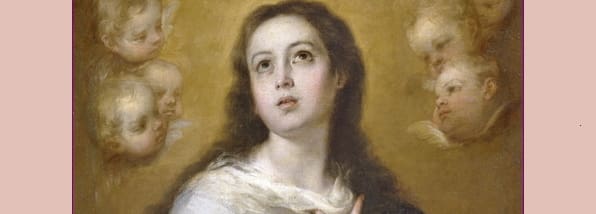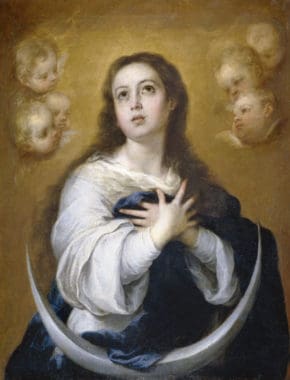Fatima, Mary and the Moslems
In our last reflection, we looked at the supernatural significance of the year 1917 as a year of two competing revolutions: one against God and the other restoring all things in God through His Mother – as the unprecedented Marian age since 1830 has undoubtedly confirmed. We looked briefly at how atheistic Communism is at the heart of the world’s evils as it completely eradicates God from society and reduces every person to a utilitarian value determined by the state. And throughout this series, we are meditating on the significance of Mary’s presence in the modern world within the proper context of the “signs of the times,” the importance of which was pointed out by Christ Himself.
If anyone doubts that we are living at a critical point in history, where the stakes for the soul of the human family have never been higher, I call to your attention the prophetic voice of St. John Paul II, shortly before he became pope, who could not have made this truth any more plain:
We are now standing in the face of the greatest historical confrontation humanity has gone through. I do not think that wide circles of American society or wide circles of the Christian community realize this fully. We are now facing the final confrontation between the Church and the anti-Church, of the Gospel versus the anti-Gospel, between Christ and Antichrist. The confrontation lies within the plans of Divine Providence. It is therefore, in God’s Plan, and it must be a trial which the Church must take up, and face courageously… (Cardinal Karol Wojtyla, Eucharistic Congress, Philadelphia, U.S.A. 1976).
At the heart of this “historical confrontation” is Mary because this enmity goes all the way back to the beginning: “I will put enmities between you and the woman, and your seed and her seed: she shall crush your head, and you shall lie in wait for her heel” (Gen 3:15) [Douay-Rheims translation of Latin Vulgate]. We fast-forward to the Book of the Apocalypse, where the veil surrounding this enmity is fully removed and the subtle serpent is now revealed as the great dragon whose attack is zeroed in on “the woman” and her offspring.
And a great sign appeared in heaven: A woman clothed with the sun, and the moon under her feet, and on her head a crown of twelve stars . . . . And there was seen another sign in heaven: and behold a great red dragon . . . and the dragon stood before the woman who was ready to be delivered; that, when she should be delivered, he might devour her son. And she brought forth a man child, who was to rule all nations with an iron rod: and her son was taken up to God, and to his throne. And the woman fled into the wilderness, where she had a place prepared by God, that there they should feed her a thousand two hundred sixty days. And there was a great battle in heaven, Michael and his angels fought with the dragon . . . And that great dragon was cast out, that old serpent, who is called the devil and Satan, who seduces the whole world; and he was cast unto the earth, and his angels were thrown down with him. [Rev 12:1, 3, 4, 5-7, 9, Douay-Rheims]
In other words, at the heart of our historic confrontation is “the woman clothed with the sun and the moon under her feet” against the “great red dragon.” So, when Mary is sent to the world scene, especially with frequency, two things should immediately come to mind: She is warning us of an intensifying battle against the dragon, and a great opportunity for grace comes with that because she is the inseparable Spouse of the Holy Spirit and the Advent of Christ. This is what makes the promised triumph of Our Lady and subsequent “era of peace” promised by Our Blessed Mother at Fatima so exciting. Only for Catholics is a new dark age a powerful opportunity to bring the Light of Christ into the world.
This is why Mary being compared to the moon is so important as the sign of our hope, as Venerable Fulton Sheen put it:
God, Who made the sun, also made the moon. The moon does not take away from the brilliance of the sun. The moon would be only a burnt-out cinder floating in the immensity of space were it not for the sun. All its light is reflected from the sun. The Blessed Mother reflects her Divine Son; without Him, she is nothing. With Him, she is the Mother of Men. On dark nights we are grateful for the moon; when we see it shining, we know there must be a sun. So in this dark night of the world when men turn their backs on Him Who is the Light of the World, we look to Mary to guide their feet while we await the sunrise (The World’s First Love, chapter 5, last paragraph).
And as we wade through our present “valley of tears” awaiting the sunrise, we face another threat to world peace and the Christian faith to which the message of Fatima alluded – Islam. Communism was the explicit political and philosophical threat, but the explicit religious threat is hinted at by the name of the very location where Mary was sent to appear: Fatima. The city of Fatima has an interesting history, as Fulton Sheen explains:
[T]he Muslims occupied Portugal for centuries. At the time when they were finally driven out, the last Muslim chief had a beautiful daughter by the name of Fatima. A Catholic boy fell in love with her, and for him she not only stayed behind when the Muslims left but even embraced the Faith. The young husband was so much in love with her that he changed the name of the town where he lived to Fatima. Thus, the very place where Our Lady appeared in 1917 bears a historical connection to Fatima the daughter of Mohammed (The World’s First Love, chapter 17, paragraph 14).
While Communism is a threat to Christianity from within – by stealing the human soul – Islam is a threat from without because historically, it has spread its religion through fear and force. By 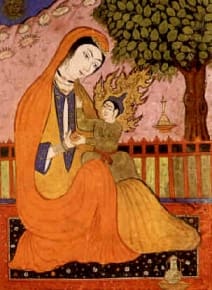 Mary appearing at a place with explicit Moslem connections, even to its founder, she reveals a spiritual Trojan Horse through which it can be converted. The first crack in the armor of Islam is that Moslems share faith in the Immaculate Conception and the Virgin Birth. As Fulton Sheen points out: “In the nineteenth chapter of the Koran there are forty-one verses on Jesus and Mary. There is such a strong defense of the virginity of Mary here that the Koran, in the fourth book, attributes the condemnation of the Jews to their monstrous calumny against the Virgin Mary” (The World’s First Love, chapter 17, paragraph 10).
Mary appearing at a place with explicit Moslem connections, even to its founder, she reveals a spiritual Trojan Horse through which it can be converted. The first crack in the armor of Islam is that Moslems share faith in the Immaculate Conception and the Virgin Birth. As Fulton Sheen points out: “In the nineteenth chapter of the Koran there are forty-one verses on Jesus and Mary. There is such a strong defense of the virginity of Mary here that the Koran, in the fourth book, attributes the condemnation of the Jews to their monstrous calumny against the Virgin Mary” (The World’s First Love, chapter 17, paragraph 10).
There is another crack in the armor of Islam that is due to Mary. In Islam’s writings, while Jesus is esteemed no more than a mere 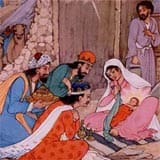 prophet from God, Mary is esteemed even greater than Fatima, the daughter of Mohammed. So, the strategic selection by God to send His mother to a city named after the most esteemed woman in Islam, after Mary, is no mere coincidence. I again point to Fulton Sheen who made this same connection as he wondered:
prophet from God, Mary is esteemed even greater than Fatima, the daughter of Mohammed. So, the strategic selection by God to send His mother to a city named after the most esteemed woman in Islam, after Mary, is no mere coincidence. I again point to Fulton Sheen who made this same connection as he wondered:
…why the Blessed Mother, in this twentieth century, should have revealed herself in the insignificant little village of Fatima, so that to all future generations she would be known as Our Lady of Fatima. Since nothing ever happens out of Heaven except with a finesse of all details, I believe that the Blessed Virgin chose to be known as ‘Our Lady of Fatima’ as a pledge and a sign of hope to the Muslim people and as an assurance that they, who show her so much respect, will one day accept her Divine Son, too. (The World’s First Love, chapter 17, paragraph 12).
So, how do we utilize this Marian Trojan Horse into Islam? Fulton Sheen offers a solution which may surprise many:
Missionaries in the future will, more and more, see that their apostolate among the Muslims will be successful in the measure that they preach Our Lady of Fatima. Mary is the advent of Christ, bringing Christ to the people before Christ Himself is born. In any apologetic endeavor, it is always best to start with that which people already accept. Because the Muslims have a devotion to Mary, our missionaries should be satisfied merely to expand and to develop that devotion, with the full realization that Our Blessed Lady will carry the Muslims the rest of the way to her Divine Son. She is forever a “traitor” in the sense that she will not accept any devotion for herself, but will always bring anyone who is devoted to her to her Divine Son. As those who lose devotion to her lose belief in the Divinity of Christ, so those who intensify devotion to her gradually acquire that belief.
…It now remains to use another approach, namely, that of taking the forty-first chapter of the Koran, and showing them that it was taken out of the Gospel of Luke, that Mary could not be, even in their own eyes, the most blessed of all the women of Heaven if she had not also borne One Who was the Savior of the world. If Judith and Esther of the Old Testament were prefigures of Mary, then it may very well be that Fatima herself was a postfigure of Mary! The Muslims should be prepared to acknowledge that, if Fatima must give way in honor to the Blessed Mother, it is because she is different from all the other mothers of the world and that without Christ she would be nothing (The World’s First Love, chapter 17, paragraph 15).
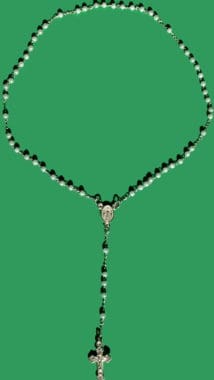 There seems little chance that this kind of “dialogue” is possible with such radically violent factions of Islam like ISIS, etc. But, Our Lady at Fatima revealed there is another weapon for the likes of ISIS, against which no evil can stand. And that is the Holy Rosary. This weapon has a particularly interesting history with the Church’s conflict with Islam and against all the evils confronting the Church. This will be the subject of next week’s reflection. Stay tuned.
There seems little chance that this kind of “dialogue” is possible with such radically violent factions of Islam like ISIS, etc. But, Our Lady at Fatima revealed there is another weapon for the likes of ISIS, against which no evil can stand. And that is the Holy Rosary. This weapon has a particularly interesting history with the Church’s conflict with Islam and against all the evils confronting the Church. This will be the subject of next week’s reflection. Stay tuned.
+
Art: Immaculate Conception Portrait, Esteban Murillo, Restored Traditions, used with permission. Virgin Mary and Jesus (Old Persian Miniature), author and date unknown; Nativity of Jesus (Isa), Hossein Behzad, date unknown; both PD-US copyright expired. Rosary on green background, Liz Estler, 6 May 2015, PD-Worldwide, self.



